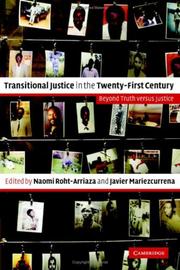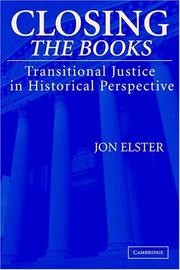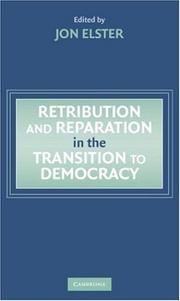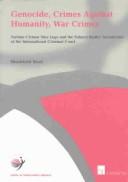| Listing 1 - 9 of 9 |
Sort by
|
Book
ISBN: 3787552243 Year: 1976 Publisher: Frankfurt am Main Metzner
Abstract | Keywords | Export | Availability | Bookmark
 Loading...
Loading...Choose an application
- Reference Manager
- EndNote
- RefWorks (Direct export to RefWorks)
343.21 --- Ex post facto laws --- -Nulla poena sine lege doctrine --- Nullum crimen sine lege doctrine --- Criminal law --- Due process of law --- Retroactive laws --- Rule of law --- Strafwet --- History --- History. --- -Strafwet --- 343.21 Strafwet --- -343.21 Strafwet --- Nulla poena sine lege doctrine
Book
ISBN: 3428100751 Year: 2000 Publisher: Berlin Duncker & Humblot
Abstract | Keywords | Export | Availability | Bookmark
 Loading...
Loading...Choose an application
- Reference Manager
- EndNote
- RefWorks (Direct export to RefWorks)
Ex post facto laws --- War crime trials --- Trials (War crimes) --- Trials (Crimes against humanity) --- Trials (Genocide) --- Trials --- Nulla poena sine lege doctrine --- Nullum crimen sine lege doctrine --- Criminal law --- Due process of law --- Retroactive laws --- Rule of law --- Schmitt, Carl, --- Schmitt-Dorotić, Carl, --- Dorotić, Carl Schmitt-, --- Shumitto, Kāru, --- Shmitt, Karl, --- שמיט, קרל, --- Šmit, Karl, --- History of Germany and Austria --- anno 1940-1949
Book
ISBN: 3110097508 3110890690 9783110097504 Year: 1983 Publisher: Berlin de Gruyter
Abstract | Keywords | Export | Availability | Bookmark
 Loading...
Loading...Choose an application
- Reference Manager
- EndNote
- RefWorks (Direct export to RefWorks)
Ex post facto laws --- Ex post facto laws (Roman law) --- History --- 343.21 --- -Ex post facto laws (Roman law) --- -Roman law --- Nulla poena sine lege doctrine --- Nullum crimen sine lege doctrine --- Criminal law --- Due process of law --- Retroactive laws --- Rule of law --- Strafwet --- History. --- -Strafwet --- 343.21 Strafwet --- -343.21 Strafwet --- Roman law --- Ex post facto laws - Germany (West) - History --- Ex post facto laws (Roman law) - History

ISBN: 9780521860109 9780521677509 0521677505 0521860105 9780511617911 1107167515 0511250045 051125055X 051133172X 0511617917 128070263X 0511248989 0511249535 9780511250040 9780511250552 9780511248986 9780511249532 9781280702631 9786610702633 6610702632 9781107167513 9780511331725 Year: 2006 Publisher: Cambridge Cambridge University Press
Abstract | Keywords | Export | Availability | Bookmark
 Loading...
Loading...Choose an application
- Reference Manager
- EndNote
- RefWorks (Direct export to RefWorks)
Dealing with the aftermath of civil conflict or the fall of a repressive government continues to trouble countries throughout the world. Whereas much of the 1990s was occupied with debates concerning the relative merits of criminal prosecutions and truth commissions, by the end of the decade a consensus emerged that this either/or approach was inappropriate and unnecessary. A second generation of transitional justice experiences have stressed both truth and justice and recognize that a single method may inadequately serve societies rebuilding after conflict or dictatorship. Based on studies in ten countries, this book analyzes how some combine multiple institutions, others experiment with community-level initiatives that draw on traditional law and culture, whilst others combine internal actions with transnational or international ones. The authors argue that transitional justice efforts must also consider the challenges to legitimacy and local ownership emerging after external military intervention or occupation.
Human rights --- Criminal law. Criminal procedure --- Law of armed conflicts. Humanitarian law --- Legal theory and methods. Philosophy of law --- anno 2000-2099 --- Transitional justice --- Ex post facto laws. --- Justice, Administration of --- Political crimes and offenses. --- Restorative justice. --- Revolutions. --- Transitional justice. --- Political aspects. --- Ex post facto laws --- Political crimes and offenses --- Restorative justice --- Revolutions --- Justice --- Insurrections --- Rebellions --- Revolts --- Revolutionary wars --- History --- Political science --- Political violence --- War --- Government, Resistance to --- Balanced and restorative justice --- BARJ (Restorative justice) --- Community justice --- Restorative community justice --- Criminal justice, Administration of --- Reparation (Criminal justice) --- Offenses, Political --- Political offenses --- Crime --- Extradition --- Subversive activities --- Justice and politics --- Nulla poena sine lege doctrine --- Nullum crimen sine lege doctrine --- Criminal law --- Due process of law --- Retroactive laws --- Rule of law --- Political aspects --- Offenses against the State --- State, Offenses against the --- Social Sciences --- Sociology

ISBN: 0521839696 0521548543 1107162564 0511231040 0511231792 0511316895 0511607016 128070232X 0511229429 0511230265 9780511230264 9780511231797 9780511316890 9780511607011 9780521839693 9780521548540 9780511229428 Year: 2004 Publisher: Cambridge, UK New York Cambridge University Press
Abstract | Keywords | Export | Availability | Bookmark
 Loading...
Loading...Choose an application
- Reference Manager
- EndNote
- RefWorks (Direct export to RefWorks)
An analysis of transitional justice - retribution and reparation after a change of political regime - from Athens in the fifth century BC to the present. Part I, 'The Universe of Transitional Justice', describes more than thirty transitions, some of them in considerable detail, others more succinctly. Part II, 'The Analytics of Transitional Justice', proposes a framework for explaining the variations among the cases - why after some transitions wrongdoers from the previous regime are punished severely and in other cases mildly or not at all, and victims sometimes compensated generously and sometimes poorly or not at all. After surveying a broad range of justifications and excuses for wrongdoings and criteria for selecting and indemnifying victims, the 2004 book concludes with a discussion of three general explanatory factors: economic and political constraints, the retributive emotions, and the play of party politics.
Political crimes and offenses. --- Justice, Administration of --- Ex post facto laws. --- Revolutions. --- Restorative justice --- Crimes et délits politiques --- Justice --- Nulla pEna sine lege --- Révolutions --- Justice réparatrice --- Political aspects --- Administration --- Aspect politique --- Transitional justice --- Political aspects. --- Transitional justice. --- Restorative justice. --- Crimes et délits politiques --- Nulla pĖna sine lege --- Révolutions --- Justice réparatrice --- Social Sciences --- Political Science --- Human rights --- Balanced and restorative justice --- BARJ (Restorative justice) --- Community justice --- Restorative community justice --- Criminal justice, Administration of --- Reparation (Criminal justice) --- Insurrections --- Rebellions --- Revolts --- Revolutionary wars --- History --- Political science --- Political violence --- War --- Government, Resistance to --- Nulla poena sine lege doctrine --- Nullum crimen sine lege doctrine --- Criminal law --- Due process of law --- Retroactive laws --- Rule of law --- Justice and politics --- Offenses against the State --- Offenses, Political --- Political offenses --- State, Offenses against the --- Crime --- Extradition --- Subversive activities

ISBN: 0521829739 9780521829731 9780511584343 9780511281877 0511281870 0511584342 9780511281082 0511281080 1139810073 9781139810074 1107147964 9781107147966 0511280661 9780511280665 1107318157 9781107318151 1299398898 9781299398894 0511281498 9780511281495 Year: 2006 Publisher: Cambridge New York Cambridge University Press
Abstract | Keywords | Export | Availability | Bookmark
 Loading...
Loading...Choose an application
- Reference Manager
- EndNote
- RefWorks (Direct export to RefWorks)
The contributions in this volume offer a comprehensive analysis of transitional justice from 1945 to the present. They focus on retribution against the leaders and agents of the autocratic regime preceding the democratic transition, and on reparation to its victims. Part I contains general theoretical discussions of retribution and reparation. The essays in Part II survey transitional justice in the wake of World War II, covering Austria, Belgium, Denmark, France, Germany, Hungary, the Netherlands, and Norway. In Part III, the contributors discuss more recent transitions in Argentina, Chile, Eastern Europe, the former German Democratic Republic, and South Africa, including a chapter on the reparation of injustice in some of these transitions. The editor provides a general introduction, brief introductions to each part, and a conclusion that looks beyond regime transitions to broader issues of rectifying historical injustice.
Political crimes and offenses. --- Justice, Administration of --- Ex post facto laws. --- Restorative justice --- Crimes et délits politiques --- Justice --- Nulla pEna sine lege --- Justice réparatrice --- Political aspects --- Administration --- Aspect politique --- Transitional justice --- Restorative justice. --- Transitional justice. --- Political aspects. --- Crimes et délits politiques --- Nulla pĖna sine lege --- Justice réparatrice --- Ex post facto laws --- Political crimes and offenses --- Human rights --- Balanced and restorative justice --- BARJ (Restorative justice) --- Community justice --- Restorative community justice --- Criminal justice, Administration of --- Reparation (Criminal justice) --- Offenses, Political --- Political offenses --- Crime --- Extradition --- Political violence --- Subversive activities --- Justice and politics --- Nulla poena sine lege doctrine --- Nullum crimen sine lege doctrine --- Criminal law --- Due process of law --- Retroactive laws --- Rule of law --- Offenses against the State --- State, Offenses against the --- Social Sciences --- Political Science --- Justice, Administration of - Political aspects
Book
ISBN: 9783540857532 9783540857549 Year: 2009 Publisher: Berlin Springer
Abstract | Keywords | Export | Availability | Bookmark
 Loading...
Loading...Choose an application
- Reference Manager
- EndNote
- RefWorks (Direct export to RefWorks)
Results of the 2007 Nuremberg Conference on Peace and Justice: Tensions between peace and justice have long been debated by scholars, practitioners and agencies including the United Nations, and both theory and policy must be refined for very practical application in situations emerging from violent conflict or political repression. Specific contexts demand concrete decisions and approaches aimed at redress of grievance and creation of conditions of social justice for a non-violent future. There has been definitive progress in a world in which blanket amnesties were granted at times with little hesitation. There is a growing understanding that accountability has pragmatic as well as principled arguments in its favour. Practical arguments as much as shifts in the norms have created a situation in which the choice is increasingly seen as "which forms of accountability" rather than a stark choice between peace and justice. It is socio-political transformation, not just an end to violence, that is needed to build sustainable peace. This book addresses these dilemmas through a thorough overview of the current state of legal obligations; discussion of the need for a holistic approach including development; analysis of the implications of the coming into force of the ICC; and a series of "hard" case studies on internationalized and local approaches devised to navigate the tensions between peace and justice.
International movements --- Politics --- European law --- Peaceful settlement of international disputes --- Criminology. Victimology --- Criminal law. Criminal procedure --- politieke wetenschappen --- strafrecht --- criminologie --- Europees recht --- Ex post facto laws --- Justice, Administration of --- Peace-building --- Political crimes and offenses --- Restorative justice --- Offenses against the State --- Offenses, Political --- Political offenses --- State, Offenses against the --- Crime --- Extradition --- Political violence --- Subversive activities --- Building peace --- Peacebuilding --- Conflict management --- Peace --- Peacekeeping forces --- Administration of justice --- Law --- Courts --- Nulla poena sine lege doctrine --- Nullum crimen sine lege doctrine --- Criminal law --- Due process of law --- Retroactive laws --- Rule of law --- Balanced and restorative justice --- BARJ (Restorative justice) --- Community justice --- Restorative community justice --- Criminal justice, Administration of --- Reparation (Criminal justice) --- Political aspects --- International cooperation --- Law and legislation

ISBN: 905095216X 9789050952163 Year: 2002 Volume: 12 Publisher: Antwerpen Intersentia
Abstract | Keywords | Export | Availability | Bookmark
 Loading...
Loading...Choose an application
- Reference Manager
- EndNote
- RefWorks (Direct export to RefWorks)
Human rights --- Criminal law. Criminal procedure --- Law of armed conflicts. Humanitarian law --- National movements --- International Criminal Court --- Droit pénal international --- Internationaal strafrecht --- Ex post facto laws --- Genocide --- War crimes --- Criminal jurisdiction --- Crimes against humanity --- International criminal court --- 341.48 --- 341.322 --- Crime --- Cleansing, Ethnic --- Ethnic cleansing --- Ethnic purification --- Ethnocide --- Purification, Ethnic --- Nulla poena sine lege doctrine --- Nullum crimen sine lege doctrine --- Criminal law --- Due process of law --- Retroactive laws --- Rule of law --- Conflict of criminal jurisdiction --- Conflict of laws --- Criminal procedure --- Exterritorial crime --- Jurisdiction --- International criminal law --- International crimes --- Misdaden tegen de mensheid. Volkerenmoord --- Oorlogsmisdaden --- International Criminal Court. --- U.N. International Criminal Court --- United Nations. --- ICC --- CPI --- Cour pénale internationale --- Corte Penal Internacional --- Internationella brottmålsdomstolen --- Pengadilan Pidana Internasional --- Kokusai Keiji Saibansho --- Mezhdunarodnyĭ ugolovnyĭ sud --- Međunarodni kazneni sud --- Międzynarodowy Trybunał Karny --- Maḥkamat al-Jināʼīyah al-Duwalīyah --- Guo ji xing shi fa yuan --- 国际刑事法院 --- Samnakngān ʻAyakān Sān ʻĀyā Rawāng Prathēt --- Tribunal Penal Internacional --- Theses --- Criminal jurisdiction. --- Genocide. --- Crimes against humanity. --- War crimes. --- Ex post facto laws. --- 341.322 Oorlogsmisdaden --- 341.48 Misdaden tegen de mensheid. Volkerenmoord --- Uluslararası Ceza Mahkemesi --- UCM --- Crimes contre l'humanité --- Génocide --- Cour penale internationale
Book
ISBN: 3540857532 3642099335 9786611920760 1281920762 3540857540 Year: 2009 Publisher: Berlin : Springer,
Abstract | Keywords | Export | Availability | Bookmark
 Loading...
Loading...Choose an application
- Reference Manager
- EndNote
- RefWorks (Direct export to RefWorks)
Results of the 2007 Nuremberg Conference on Peace and Justice: Tensions between peace and justice have long been debated by scholars, practitioners and agencies including the United Nations, and both theory and policy must be refined for very practical application in situations emerging from violent conflict or political repression. Specific contexts demand concrete decisions and approaches aimed at redress of grievance and creation of conditions of social justice for a non-violent future. There has been definitive progress in a world in which blanket amnesties were granted at times with little hesitation. There is a growing understanding that accountability has pragmatic as well as principled arguments in its favour. Practical arguments as much as shifts in the norms have created a situation in which the choice is increasingly seen as "which forms of accountability" rather than a stark choice between peace and justice. It is socio-political transformation, not just an end to violence, that is needed to build sustainable peace. This book addresses these dilemmas through a thorough overview of the current state of legal obligations; discussion of the need for a holistic approach including development; analysis of the implications of the coming into force of the ICC; and a series of "hard" case studies on internationalized and local approaches devised to navigate the tensions between peace and justice.
Political crimes and offenses. --- Political crimes and offenses --- Justice, Administration of --- Restorative justice --- Ex post facto laws --- Peace-building --- Law, Politics & Government --- Law, General & Comparative --- Political aspects --- International cooperation --- Balanced and restorative justice --- BARJ (Restorative justice) --- Community justice --- Restorative community justice --- Offenses, Political --- Political offenses --- Building peace --- Peacebuilding --- Administration of justice --- Nulla poena sine lege doctrine --- Nullum crimen sine lege doctrine --- Law and legislation --- Law. --- Political science. --- Public international law. --- International criminal law. --- Public International Law. --- Political Science. --- International Criminal Law. --- Criminology and Criminal Justice, general. --- Criminal law --- Due process of law --- Retroactive laws --- Rule of law --- Conflict management --- Peace --- Peacekeeping forces --- Law --- Courts --- Criminal justice, Administration of --- Reparation (Criminal justice) --- Crime --- Extradition --- Political violence --- Subversive activities --- Criminology. --- Public International Law . --- International Criminal Law . --- Social sciences --- Criminals --- Administration --- Civil government --- Commonwealth, The --- Government --- Political theory --- Political thought --- Politics --- Science, Political --- State, The --- Study and teaching --- Criminal law, International --- ICL (International criminal law) --- International law --- Criminal jurisdiction --- International crimes --- Law of nations --- Nations, Law of --- Public international law
| Listing 1 - 9 of 9 |
Sort by
|

 Search
Search Feedback
Feedback About UniCat
About UniCat  Help
Help News
News